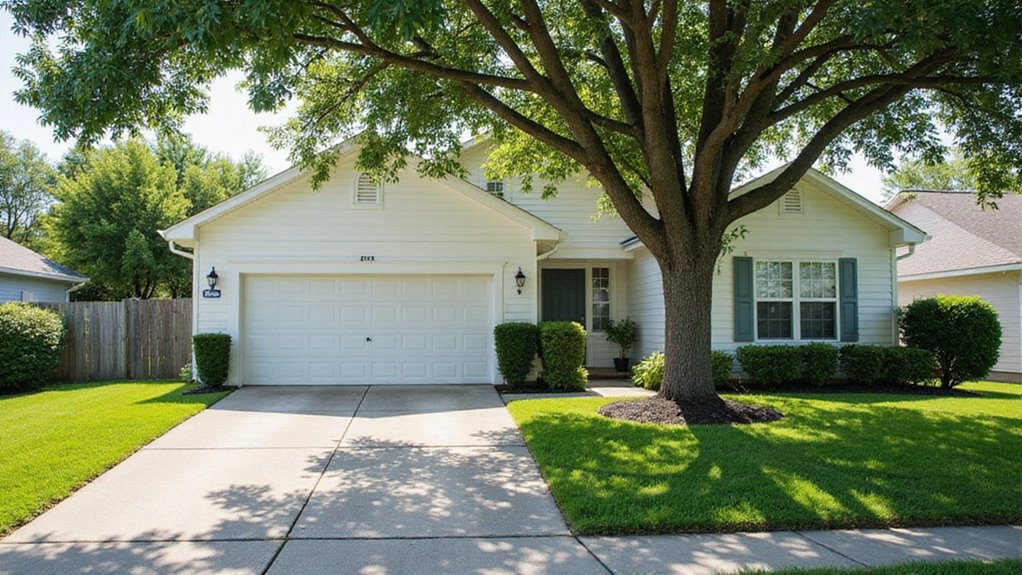Drowning in mortgage debt with no way out often feels like being trapped in financial quicksand. Homeowners facing foreclosure panic when payments become impossible to manage. The stress can seem overwhelming while credit scores plummet. Fortunately, several bank options exist that could offer relief without the full foreclosure process.
No, you cannot directly sell your house back to the bank like a regular property transaction. However, banks offer alternatives like deed in lieu of foreclosure or short sales where you can effectively surrender ownership. These processes allow homeowners to transfer property rights back to lenders under specific circumstances.
In this blog I will explore all possible options when you can’t keep your home anymore.
Key Takeaways
- You can’t directly sell your house back to the bank, but you can surrender it through options like deed in lieu or short sale.
- Deed in lieu transfers ownership to the lender, canceling the mortgage without a formal sale.
- Short sales require lender approval to sell for less than the mortgage balance.
- Selling to the bank is different from a typical sale; it involves voluntary surrender, not a market transaction.
- Alternatives include selling to cash buyers, refinancing, or applying for loan modification to avoid foreclosure.
What is Selling Your House Back to the Bank?

Selling your house back to the bank means surrendering your property to avoid foreclosure. It’s not a literal sale but a negotiated agreement. You can use two main methods for this process. A deed in lieu of foreclosure transfers ownership directly to your lender.
A short sale allows you to sell for less than you owe with lender approval. Both options require meeting specific requirements.
These alternatives help protect your credit score and financial future. Furthermore, they provide a more dignified exit from homeownership when payments become impossible.
Can You Actually Sell Your House Back to a Bank?

No, banks generally don’t buy homes directly from homeowners in Ohio. Instead, you have alternatives if you’re struggling with your mortgage.
A deed in lieu of foreclosure allows you to transfer ownership voluntarily to your lender. Short sales offer another option where you sell for less than you owe.
Both processes require lender approval and proof of financial hardship. Furthermore, you’ll need to submit documentation showing your inability to make payments.
These alternatives can help you avoid foreclosure’s negative consequences. Many homeowners find these options less damaging to their credit and financial future.
What Are Your Options for Surrendering a Home?

You have several options for surrendering your home, including a deed in lieu of foreclosure or a short sale, both requiring lender approval.
Voluntary foreclosure is a last resort with legal and financial risks, while bank buyback programs don’t exist outside foreclosure procedures in Ohio. Understanding these choices helps you decide the best course to minimize damage and protect your interests.
Deed in Lieu of Foreclosure Explained
A deed in lieu of foreclosure is a voluntary property title transfer to your lender instead of facing foreclosure. This option helps homeowners who can’t meet mortgage obligations. You transfer ownership directly to the lender to satisfy the debt.
This arrangement cancels your remaining mortgage balance and stops collection efforts. The process requires good faith negotiation and complete financial disclosure. Lenders typically want proof that selling the home wouldn’t yield better results.
Many homeowners choose this path to avoid public foreclosure records. Furthermore, it reduces legal costs and emotional stress. Federal laws require lenders to consider alternatives before proceeding with foreclosure actions.
Short Sale Process
A short sale occurs when you sell your home for less than what you owe on the mortgage. Your lender must approve this option before proceeding. This process helps homeowners who can’t pay their mortgage avoid the harsh consequences of foreclosure.
Short sales typically cause less damage to credit scores than foreclosures do. Lenders might agree to this arrangement because they often recover more money than through foreclosure auctions.
Furthermore, you can exit your home with dignity and more control over the timeline. Federal programs may offer additional assistance during short sales, depending on your loan type and circumstances. As a result, this path provides a more compassionate solution during financial hardship.
Voluntary Foreclosure Considerations
Voluntary foreclosure means surrendering your home when mortgage payments become impossible. This choice helps avoid deeper financial problems. You can protect your interests by understanding all options.
Three main alternatives exist for homeowners: deed in lieu of foreclosure, short sale, or accepting foreclosure proceedings. Each option carries different legal and tax consequences. However, these choices may offer relief from mounting debt.
Before deciding, consult with housing counselors or legal advisors. Financial impacts will affect your credit for years to come. As a result, proper planning becomes essential during this difficult time.
Bank Buyback Programs
Bank buyback programs don’t exist in Ohio outside of foreclosure processes. You can’t sell your house back to the bank directly. Banks offer alternative solutions for homeowners facing mortgage difficulties.
Deed in lieu allows you to voluntarily transfer property ownership to the bank. This option cancels your remaining debt. Short sales permit selling your home for less than the mortgage amount. The bank might forgive the remaining balance in this scenario.
Foreclosure remains the formal legal process that results in home loss and credit damage. Consider negotiating with your lender early. Many banks prefer arrangements that avoid costly foreclosure proceedings.
What Are the Financial Consequences?
Selling your home back to the bank can significantly impact your credit score, making it harder to qualify for future loans. It may also trigger tax consequences if forgiven debt is considered taxable income, and you could still owe remaining debts unless properly released.
Additionally, your ability to get a new mortgage will likely be delayed for several years, depending on the type of surrender you choose.
Impact on Credit Score
A deed in lieu or short sale will hurt your credit score less than foreclosure. Your score will drop 50-150 points, depending on your starting score and payment history. These actions remain on your credit reports for 7 years from the date of the first missed payment.
Late payments leading up to these events also damage your score. Some lenders may forgive remaining mortgage debt, though this varies by state and lender policy. As a result, you might face higher interest rates and stricter terms when applying for future loans.
Tax Implications
Forgiven mortgage debt often counts as taxable income. The IRS typically requires you to pay taxes on any canceled debt from a short sale or deed in lieu.
However, several exclusions exist that may help you avoid this tax burden. Insolvency offers one common exemption. This applies when your total debts exceed your assets. The Mortgage Forgiveness Debt Relief Act may also provide protection in certain situations.
Always consult a tax professional before finalizing any debt forgiveness arrangement. With proper planning, you can minimize financial impact while recovering from mortgage difficulties. Furthermore, keeping detailed records of all transactions will strengthen your position during tax preparation.
Remaining Debt Obligations
Choosing deed in lieu or short sale doesn’t always eliminate your mortgage debt completely. You may still face deficiency judgments when lenders pursue the difference between property value and loan balance.
Lenders can legally collect any remaining mortgage balance in many states. Your liability continues until the debt is fully resolved or forgiven.
These remaining obligations also affect future financial options. You might’ve limited access to foreclosure prevention programs.
Tax consequences could arise if debt over $600 is forgiven, as the IRS may count it as income. Understanding these potential financial burdens helps make better decisions. Consult with financial advisors before finalizing any property transfer arrangements.
Future Mortgage Eligibility
Foreclosure alternatives delay your ability to qualify for new mortgages. A deed in lieu, short sale, or foreclosure can affect your credit for up to seven years. These events typically reduce your credit score by 100-150 points.
Lenders view them as red flags when reviewing applications. Most conventional loan programs require a waiting period before you can apply again.
FHA loans may be available after just one year with certain hardship exemptions. VA loans often have more flexible guidelines. Planning ahead helps you rebuild credit during these waiting periods.
Recovery starts with establishing positive payment history and reducing debt. This approach creates a path back to homeownership.
How to Sell Your House Back to the Bank?
To sell your house back to the bank, start by contacting your lender in writing to explain your situation.Next, gather and submit all necessary documents, like proof of hardship and financial records, to support your case.
Finally, negotiate terms with your lender and finalize the transfer with proper paperwork to complete the process.
Contacting Your Lender
Contact your lender immediately when financial problems arise. Early communication gives you access to alternatives like deed in lieu or short sale. Your lender can offer solutions before foreclosure proceedings begin.
Share your financial hardship honestly with specific details. Ask about all available options to avoid foreclosure. Submit required financial documents within the timeline your lender specifies.
Proactive communication demonstrates your commitment to resolving the situation. Most lenders prefer to work with borrowers rather than pursue foreclosure. Furthermore, keeping open lines of communication protects your credit score from severe damage.
Documenting Financial Hardship
Proof of financial hardship requires specific documentation. Collect mortgage statements showing missed payments, bank statements, and tax returns. Unemployment benefits letters or termination notices prove job loss. Medical bills and insurance claim denials show health-related expenses.
Your documentation must be current and complete. Lenders need to see the full picture of your situation. Most lenders require at least three months of financial records to verify hardship claims. This timeline helps establish patterns rather than temporary setbacks.
Organize your paperwork chronologically for easy review. Include a hardship letter explaining your circumstances. Many financial institutions offer document checklists on their websites.
Submitting the Required Paperwork
To sell your house back to the bank, you must submit specific documents. First, provide proof of financial hardship like pay stubs or medical bills.
Second, include records showing you’ve explored other mortgage options. Third, submit your property details and recent tax returns.
These documents help your lender understand your financial situation fully. The bank needs this information to consider alternatives to foreclosure.
You must submit all paperwork completely and accurately to avoid delays. Once received, your lender will review your case and determine eligibility. This process typically resolves mortgage issues without damaging your credit as severely as foreclosure.
Negotiating Terms
Negotiation begins after you submit all required paperwork to your lender. Focus on clear communication when discussing your situation. Remain flexible throughout the process to reach favorable outcomes.
This table outlines key discussion points for both parties:
| Your Goals | Lender’s Priorities | Possible Outcomes |
|---|---|---|
| Debt reduction | Minimize loss | Reduced debt or forgiveness |
| Move-out timeline | Property condition | Agreed move date |
| Avoid foreclosure | Loan recovery | Settlement agreement |
| Financial hardship proof | Repayment ability | Modified payment plan |
| Fair settlement | Legal compliance | Mutually beneficial terms |
Lenders must follow specific regulations when negotiating settlements. Be prepared to provide evidence of your financial situation. Reasonable requests often lead to better results than demanding approaches.
Finalizing the Transaction
Complete these key steps to finish your property transaction. Sign all required documents and ensure mortgage conditions are fully met. Your lender will provide specific instructions for the closing process.
You must satisfy all loan terms before ownership can transfer. The final paperwork includes deed transfer and debt release documentation. Review everything carefully before signing. A real estate attorney can help protect your interests during this critical phase.
After completion, you’ll receive confirmation that releases you from the property debt. This official documentation serves as proof that the transaction is complete.
When is Selling to the Bank a Good Idea?
Selling to the bank makes sense when your home value drops below your mortgage balance. This underwater situation creates financial strain that’s hard to overcome. You can avoid ongoing losses and potential legal complications through this option.
The bank purchase provides an exit from your mortgage obligation with less credit damage. Many homeowners find relief when they can no longer afford payments.
In most states, this process requires proof of financial hardship and documentation of your property’s market value. This approach helps you move forward without the burden of an unaffordable home.
What Are Better Alternatives to Consider?
Instead of selling back to the bank, consider options like selling to cash home buyers for a quick sale or exploring refinancing to lower your payments.
You might also qualify for a loan modification to make your mortgage more manageable or rent out your property to generate income. These alternatives can help you avoid foreclosure and keep more control over your situation.
Selling to Cash Home Buyers
Cash home buyers purchase properties directly with cash, skipping traditional real estate processes. They offer accelerated timelines without the typical selling complications. You can sell your house “as-is” without making costly repairs.
Most cash buyers can close within 7-14 days compared to 30-60 days with traditional buyers. Furthermore, you’ll avoid paying the standard 5-6% agent commission fees. As a result, homeowners facing foreclosure or needing immediate financial relief find this option particularly valuable.
In addition to speed, these transactions eliminate contingencies like financing approval or home inspections. Many cash buyers handle paperwork and closing costs to simplify your experience.
Refinancing Options
Refinancing helps homeowners avoid selling or foreclosure while keeping their homes. You can lower monthly payments through a home loan refinance or modification. These options may extend your loan term or reduce your interest rate.
Your credit score remains protected when you choose refinancing over foreclosure. Additionally, refinancing maintains stability for your dependents and family members.
Most lenders require a minimum credit score of 620 for conventional refinancing. The process typically takes 30-45 days to complete. After approval, you’ll sign new loan documents and continue making payments under the revised terms.
Loan Modification Possibilities
Loan modifications change your existing mortgage terms to make payments more affordable. You can request lower interest rates, extended loan terms, or principal forbearance. These changes often prevent foreclosure when you’re struggling financially.
Most lenders offer modifications that can reduce monthly payments by 20-40% in qualifying situations. Additionally, some programs freeze interest rates for the first five years after modification.
Your credit score may drop temporarily after modification. However, this impact is less severe than foreclosure consequences. Furthermore, you’ll need to provide proof of financial hardship to qualify.
Renting Out Your Property
Yes, renting your property can create income to help pay your mortgage during tough times. Your property becomes a source of revenue while you maintain ownership. This approach lets someone else help cover your costs.
Legal considerations matter when becoming a landlord. Most states require specific lease agreements and security deposit handling. You should understand tenant rights in your area. Professional housing counselors can guide you through these requirements.
Many homeowners find this strategy preserves their investment long-term. The rental income often covers most or all mortgage payments. Additionally, you provide valuable housing for people in your community.
Ready to Sell Your House Fast for Cash? Contact Prestige Investments Cincinnati Today
Prestige Investments Cincinnati buys houses for cash quickly. We offer fast closings without the delays of traditional sales. Our team purchases properties in any condition without requiring repairs.
We typically close cash transactions within 7-14 days. This timeline helps homeowners facing foreclosure or urgent financial needs.
Additionally, we handle all paperwork and closing costs. Furthermore, our process eliminates the stress of showings and uncertain buyers. Many sellers appreciate avoiding real estate commissions and lengthy negotiations. Contact us today for a no-obligation cash offer on your home.
Frequently Asked Questions
Can I Negotiate a Bank Buyback Outside of Foreclosure in Ohio?
You can’t negotiate a bank buyback outside foreclosure in Ohio; banks don’t buy homes directly from homeowners. Instead, investigate options like deed in lieu or short sale, with lender approval and proper documentation, to settle your mortgage hardship.
Are There Specific Penalties for Selling My House Back to the Bank?
You won’t face specific penalties for selling your house back to the bank, but you may encounter tax liabilities on forgiven debt and powerful damage to your credit. Ensure you understand these implications before proceeding.
How Long Does the Deed in Lieu or Short Sale Process Typically Take?
The process usually takes 30 to 90 days, like a well-timed relay race. You’ll gather documents, negotiate, and wait for approval, so patience and clear communication help ensure a smoother, faster journey through these options.
Does Ohio Law Limit the Amount of Deficiency a Lender Can Pursue?
Ohio law limits deficiency judgments in certain cases, especially with short sales, but lenders can pursue deficiencies if not protected. You should seek legal advice to understand your rights and how protections apply to your specific situation.
Can I Use a Bank Buyback Option if I Have Multiple Liens?
You can’t use a bank buyback option if you have multiple liens, as Ohio law and banks typically don’t enable repurchase outside foreclosure. Focus on negotiating lien reductions or pursuing legal options to resolve multiple claims effectively.





